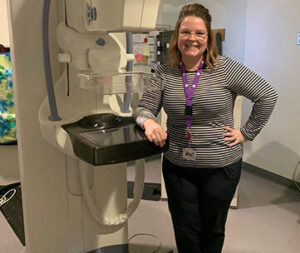Mammography
What we do

Screening or routine mammography is performed by a technologist who is specially trained in breast imaging. The examination is performed primarily for the early detection of breast cancer.
Mammography is performed to evaluate and detect abnormalities in the breast tissue and glands.
Diagnostic mammography examinations are performed as a follow-up to a screening or routine mammogram where a possible abnormality has been detected on the images.
What patients can expect
The initial screening or routine mammogram requires two images of each breast, one from the top and one from the side. The breast is placed on a platform and compressed with a plastic paddle during the examination. Compression is necessary to:
- Obtain a high-quality image, flattening the breast so that all breast tissue is close to the same thickness.
- Even out the breast tissue so that structures do not overlap.
- Reduce radiation exposure.
- Prevent motion that could blur the image.
The examination can be uncomfortable due to the compression of the breast but should not be painful. If your breasts are tender before your period, you should try to schedule your appointment at a time when your breasts are less sensitive. The procedure takes approximately 10-15 minutes.
Your images will be viewed before you leave the department. In some cases, additional images may need to be taken. This is normal. Fifteen to 20 percent of patients will require additional imaging. Most patients who require additional imaging will receive a normal report. Additional tests such as ultrasound, MRI, core biopsy, etc. may also be required before a final diagnosis is provided to your doctor.
For more information about mammography, including benefits and risks, please see the Provincial Cancer Care’s Breast Cancer Screening Program.
Locations that offer this service
Please note:
- Patients are notified by telephone and/or appointment letter for all services that require an appointment.
How to prepare
You will be asked to refrain from using perfumes, deodorants, powders, or body lotions as they may interfere with the X-ray image. Instructions for preparation specific to your test (or procedure) will be included in your appointment letter. The doctor who ordered your examination may also give you information about the required preparation.
Benefits
The major benefit of mammography is the early detection of breast cancer which significantly increases the chances of successfully treating the disease.
When small cancers are found, the patient has more treatment options, and a cure is more likely.
Mammography can detect very tiny, abnormal spots (microscopic calcifications) that would never be found on breast self-examination.
Risks
Mammography uses small doses of radiation. Precautions are continually taken to minimize the amount of radiation necessary to complete the procedure.
There is a slight risk of rupture of breast implants for patients who have them.
Test results
Your examination will be reported by a radiologist or nuclear medicine physician and sent to your doctor within 15 business days.
Please check with your doctor’s office to find out if your report has been received.
Safety precautions
Please advise your doctor and the technologist performing the procedure if you are breastfeeding or if there is any possibility that you may be pregnant.
